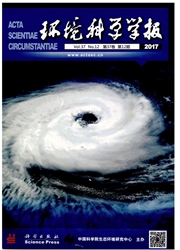

 中文摘要:
中文摘要:
采集某市29所驾校地面灰尘混合样品,用ICP-MS法测定样品Cu、Zn、Pb、Cd、Cr、Ni和Co含量,AFS法测定As和Hg含量,用污染负荷指数(PLI)评价重金属污染,用美国国家环保局(US EPA)推荐的健康风险模型评价3种情景下(情景1、2、3分别为在驾校工作10、20和30 a)的重金属暴露健康风险.结果表明,驾校灰尘除Co和Ni外,其他重金属都不同程度地高于当地背景值;9种重金属的平均PLI为2.38,总体上呈中度污染,Zn、Pb和Cd积累最为严重,总体上呈重度污染;位于工业企业附近的驾校J20和J26存在非致癌风险(HI〉1),Pb是最主要的非致癌风险因子,其他驾校均不存在非致癌风险;驾校J20在情境2、3下As的致癌风险指数(RAs)大于10-4,存在致癌风险,As是最主要的致癌风险因子,其他驾校在3种情景下均无致癌风险;手-口摄入重金属是最主要的非致癌和致癌风险暴露途径;驾校灰尘重金属含量及其健康风险与建校时间、教练车密度并不显著相关,而与其周边环境、前期土地利用状况密切相关.
 英文摘要:
英文摘要:
Twenty-nine surface dust samples were collected from driving schools in a city of Henan.Concentrations of Cu,Zn,Pb,Cd,Cr,Ni and Co in dust samples were measured by inductively coupled plasma mass-spectrometry(ICP-MS),while Hg and As were analyzed using atomic fluorescence spectrometry(AFS).The pollution of heavy metal in surface dusts was assessed by pollution load index(PLI),and the health risks exposed to heavy metals in dust in three different scenarios(working for 10 a,20a and 30 a in driving-school) were estimated using the health risk assessment model developed by US EPA.The results show that concentrations of the most heavy metals in dusts are higher than their background values except Co and Ni.Average PLI of nine metals in dusts is 2.38 with moderately pollution.In contrast,the accumulations of Zn,Cd and Pb in dusts are the most serious with heavy pollution.Pb is the major non-cancer risk factor,and non-cancer risks of metals are lower than their thresholds(HI 1) except samples J20 and J26.As is the major carcinogen risk factor,and carcinogen risks of metals are lower than their thresholds(1× 10-4) in three different scenarios except sample J20 in scenes of 2 and 3.Average daily doses by ingestion of dust particles for all metals are much higher than those by inhalation of re-suspended dust particles and dermal contact with dust particles.The concentrations and health risks of heavy metals in dusts are closely associated with the surroundings around driving schools and the previous land use status,but not significantly with the operation time and densities of coach car densities in driving schools.
 同期刊论文项目
同期刊论文项目
 同项目期刊论文
同项目期刊论文
 期刊信息
期刊信息
